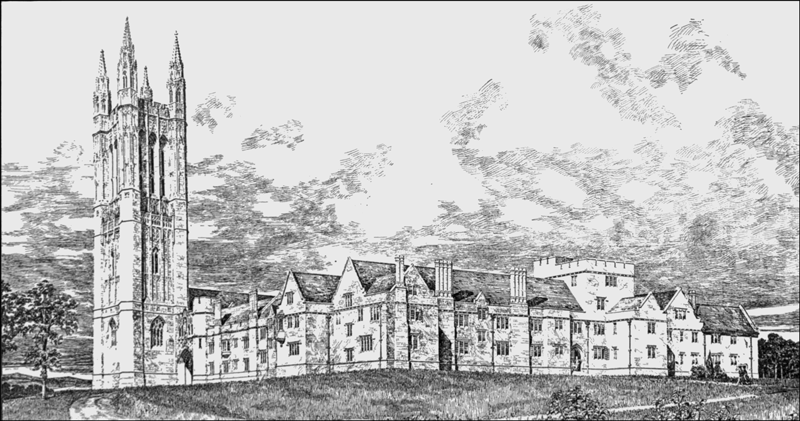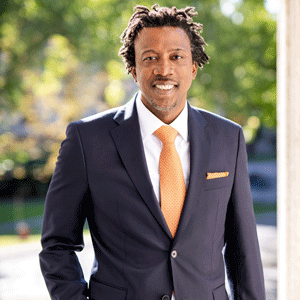A Century-long Partnership
ENS and Princeton University Graduate School
One hundred years after their first academic exchange, ENS and Princeton University Graduate School are celebrating a new agreement between the two institutions.
Professor Rodney D. Priestley, Dean of Princeton University Graduate School and co-signatory of the new agreement in Paris, explains the importance of international partnerships in scientific education, the challenges facing graduate schools and universities today, and how his year in Paris at ESPCI-PSL impacted his life.
Few of the world’s academic exchanges have stood the test of time as successfully as the bond between the École normale supérieure and Princeton University Graduate School. As they celebrate the centenary of the Jane Eliza Procter Fellowship, the longest-running partnership for both schools, a new agreement is laying the foundations for further scientific study in the years ahead.
A program with a long history
The fellowship is a one-year study program funded by an endowment created by Jane Eliza Procter’s husband, William Cooper Procter, grandson of the co-founder of the Procter and Gamble company. Initially featuring one student each from ENS and the English universities of Oxford and Cambridge, an additional place was later awarded to ENS. From France, the first of nearly 200 ‘normaliens’ to have crossed the Atlantic was René Lamar, a member of the 1922-23 program who later pursued a high school teaching career in English and American studies.
Today, ENS fellowship students visit Princeton for a full academic year in either a research or study capacity, or a combination of the two roles, while students from Princeton follow courses at ENS. Outside the fellowship scheme, six new placements as Visiting Student Research Collaborators have been created by each school to host students for one semester.
“It’s an example of what international partnerships between universities and graduate schools could look like, what their longevity can entail, and how they can impact the education and experiences of students at both institutions. We are extremely proud to have had such a lasting partnership with École normale.”
Professor Rodney D. Priestley,
Dean of Graduate School at Princeton University.

The benefits of international collaboration
For Professor Priestley, a former post-doctoral fellow at the École Supérieure de Physique et de Chimie Industrielles in Paris (ESPCI), international cooperation plays a vital part in the past, present, and future of scientific research. “From the 1920s to the 2020s, research has been a collaboration among individuals, and it’s still an international endeavor,” he says. “When it comes to partnerships, one should think beyond the borders of one’s own country and seize the opportunities to learn from one another and to share resources… because when people from different backgrounds come together, new knowledge is not the only outcome. There is also an understanding of other people’s perspectives and cultures, and how that informs their science and their decision-making process. As we celebrate this relationship between ENS and Princeton and think about the future, we shouldn’t see the outcome as just the scholarship. I think that it’s critically important.”
Understanding fellow scientists through partnerships such as that between ENS and Princeton can also play a role in preparing the wider world for the changes that lie ahead. In an era when the ivory tower of academics is increasingly being vacated in favor of university-led accelerators and tech start-ups, this connection between science and society looks set to draw even closer.
“Gaining an appreciation of the culture and environment in another part of the world becomes ever more important as research moves beyond the confines of the university gates and has an impact on society,” argues Prof. Priestley. “Because you are then moving into the realm of innovation, and that is a societal process. And understanding all of society is critical for that to be successful.”
Meeting the challenge of interdisciplinary science
Societal change is not the only challenge facing institutions such as ENS and Princeton, however. The growing trend for interdisciplinary research within the scientific community will also have consequences for universities and graduate schools. Such a move is mostly positive, according to Prof. Priestley, “but a lot of academic structures have been in place for a long time. So, when it comes to creating new doctorial programs for the interdisciplinary age, how do you support students in these programs and ensure they’re being trained appropriately? How do you ensure there is actually a market for their talent and skills when they complete their degrees? It’s a challenge and an opportunity for a graduate school to respond to that changing landscape. At least in American institutions, and I think it’s true in France, the connection between scholarship and actual societal problems, between research and the entrepreneurship pipeline, will only become more important in the years ahead.”
A rendez-vous with ENS
For the more immediate future, Prof. Priestley’s focus is trained firmly on his return to Paris, where his academic status in chemical engineering reached a new level. Attracted by a city with a strong track record of research in his chosen fields of soft matter and polymer science, and determined to gain international research experience, his year at ESPCI-PSL proved invaluable. “The experience gave me a tremendous amount of perspective,” he says, “with its training in creativity, in thinking outside the box, and being exposed to a new field of research and new colleagues. It was a critically important junction in my career, with the transition from a graduate student to forming my own research group. It certainly was a growing up experience academically … and it also impacted me personally.”
Today, his role in the scientific community in Paris has come full circle. “When I left in 2009, I knew I was coming to Princeton,” he reveals. “But I did not imagine that 14 years later I’d be representing the institution in Paris, not only signing a new agreement with ENS but also celebrating a 100-year-old partnership. It will be a special moment and I’m certainly grateful to be representing Princeton in that regard.”

